ध्रुवीय ज्योति ऑरोरा / उत्तरी और दक्षिणी ज्योति
"ऑरोरा (Aurora)" एक प्राकृतिक रमणीय घटना है, जो आकाश में उज्जवल और रंगीन प्रकाश प्रदर्शित करता है। यह ध्रुवक्षेत्रों के वायुमंडल के ऊपरी भाग में दिखाई पड़ती है। उत्तरी अक्षांशों की ध्रुवीय ज्योति को सुमेरु ज्योति (लैटिन:aurora borealis), या उत्तर ध्रुवीय ज्योति, तथा दक्षिणी अक्षांशो की ध्रुवीय ज्योति को कुमेरु ज्योति (लैटिन:aurora australis), या दक्षिण ध्रुवीय ज्योति कहते हैं।प्राचीन रोम वासियों और यूनानियों को इन घटनाओं का ज्ञान था और उन्होंने इन तथ्यों का बेहद रोचक और विस्तृत वर्णन किया है।
आर्कटिक सर्कल में उन्हें ऑरोरा बोरियलिस या उत्तरी रोशनी के रूप में जाना जाता है जबकि अंटार्कटिक सर्कल में उन्हें ऑरोरा आस्ट्रेलिया या दक्षिणी रोशनी कहा जाता है।
यह अद्भुत और रंगीन रोशनी तब बनती है जब सौर हवाओं से विद्युत आवेशित कण पृथ्वी के वायुमंडल में प्रवेश करते हैं और वातावरण में गैसों के साथ परस्पर क्रिया करते हैं।
इस प्राकृतिक घटना को समझने के लिए हमें पृथ्वी और सूर्य के बारे में थोड़ी जानकारी एकत्रित करनी होगी, जो इस प्रकार है-
उच्च ऊर्जा कणों की धारा
सूर्य लगातार विद्युत चुंबकीय विकिरण और अत्यधिक ऊर्जा वाले कणों को अंतरिक्ष में उत्सर्जित करता है, जो अंतरिक्ष मौसम उत्पन्न करते हैं। सौर हवा अंतरिक्ष मौसम का हिस्सा है, और अत्यधिक ऊर्जावान कणों कि एक सतत धारा है-ज्यादातर इलेक्ट्रॉन और प्रोटॉन-जो सूर्य से बहुत तेज गति और उच्च तापमान पर अंतरिक्ष के माध्यम से बाहर निकलते हैं। ये सौर हवाएं एक मिलियन मील प्रति घंटे की गति तक पहुंच सकती हैं।
पृथ्वी एक विशाल चुंबक है-
पृथ्वी एक विशाल चुंबक है जिसका चुंबकीय क्षेत्र पृथ्वी के केंद्र से अंतरिक्ष में उस क्षेत्र तक फैला हुआ है जहां यह सौर हवाओं से मिलता है। इस क्षेत्र का वह क्षेत्र जहां पृथ्वी का चुंबकीय प्रभाव सौर हवाओं पर हावी होता है मैग्नेटोस्फीयर के रूप में जाना जाता है। सौर हवाओं के टकराव से इसका आकार और प्रकार लगातार बदलता रहता है।
पृथ्वी का मैग्नेटोस्फीयर पृथ्वी को सौर हवाओं और अन्य हानिकारक ब्रह्मांडीय किरणों से बचाता है। यह सौर हवाओं से अधिकांश अत्यधिक आवेशित कणों को विक्षेपित करता है और उन्हें पृथ्वी के वायुमंडल में प्रवेश करने से रोकता है।
उच्च ऊर्जा टकराव
जबकि पृथ्वी का मैग्नेटोस्फीयर इस सौर हवा में अधिक आवेशित कणों से बचाने के लिए जिम्मेदार है, कभी-कभी जब परिस्थितियां सही होती हैं तो ये कण दो ध्रुवों पर पृथ्वी के वायुमंडल में प्रवेश करते हैं, जहां वे टकराते हैं और गैस के अणु और परमाणु को प्रभावित करते हैं।
जब इस तरह के टकराव होते हैं तो सौर हवाओं में इलेक्ट्रॉनों से ऊर्जा विभिन्न वायुमंडलीय गैसों के परमाणुओं के इलेक्ट्रॉनों में स्थानांतरित हो जाती है। फिर इन उत्तेजित परमाणुओं द्वारा किसी भी अतिरिक्त ऊर्जा को प्रकाश के रूप में छोड़ा जाता है।
ऑरोरा लाइट डिस्प्ले पृथ्वी की सतह से 50 मील (80.43 किलोमीटर) और 200 मील(321.87 किलोमीटर) के बीच होते हैं।
कई अलग-अलग रंग
प्रकाश का रंग गैस के अणुओं के प्रकार, टक्कर के समय उनकी विद्युत स्थिति, और वे किस प्रकार के सौर पवन कणों से टकराते हैं, पर निर्भर करता है। ऑक्सीजन परमाणु पीले - हरे या लाल रंग का प्रकाश उत्सर्जित करते हैं, जबकि नाइट्रोजन परमाणु नीले या बैगनी लाल रंग का प्रकाश उत्पन्न करते हैं। पृथ्वी के वायुमंडल में गैसों का मिश्रण बहुरंगी ऑरोरा बनाता है।
क्योंकि सौर हवाओं के कण लगातार पृथ्वी के वायुमंडल में प्रवेश करते हैं और गैस परमाणुओं के साथ टकराते हैं, इसलिए ऑरोरा डिस्प्ले स्थिर और साथ ही गतिशील हो सकते हैं-वे आकार और रंग बदल सकते हैं और आसमान में स्पंदित हो सकते हैं। ऑरोरल आकृतियां छः श्रेणियों में आती हैं-पर्दे, बैंड, घुंघट कोरोनस, पैच और किरणें।
उत्तरी रोशनी देखने के लिए सर्वोत्तम स्थान
यदि ऑरोरा को अंतरिक्ष से देखा जाए तो वह दोनों ध्रुवों के चारों ओर लगभग 2500 मील (4000 किलोमीटर) में फैले एक वलय के आकार का अरोरा दिखेगा। यह आरोरल जोन मध्य और उत्तरी अलास्का और कनाडा, ग्रीनलैंड, उतरी स्कैंडिनेविया और उत्तरी गोलार्ध में रूस और दक्षिणी गोलार्ध में एंटार्कटिका को कवर करता है। दक्षिण में, ऑरोरा को कभी-कभी दक्षिणी आस्ट्रेलिया, न्यूजीलैंड और चिली से देखा जा सकता है।
कभी-कभी उच्च स्तर की सौर गतिविधि पृथ्वी के मैग्नेटोस्फीयर के साथ टकराते हुए सौर हवाओं के तेज और हिंसक झोंकों को जन्म दे सकती है, जिससे भू- चुंबकीय तूफान हो सकता है। यह ध्रुवों के आसपास के क्षेत्र का विस्तार कर सकता है, जहां से ऑरोरल गतिविधि देखी जा सकती हैं जिससे निचले अक्षांशों पर ऑरोरा देखने की संभावना बढ़ जाती है।
बहुत ही दुर्लभ अवसरों पर भूमध्य रेखा के करीब के स्थानों से ऑरोरल डिस्प्ले देखे जा सकते हैं उदाहरण के लिए, 1909 में, एक बहुत ही मजबूत भू-चुंबकीय तूफान के कारण सिंगापुर में लोग ऑरोरल डिस्प्ले देखने में सक्षम थे।
ऑरोरल लाइट देखने का सबसे अच्छा समय-
जबकि ऑरोरल गतिविधि और ऑरोरा पूरे वर्ष, दिन और रात में हो सकते हैं, उन्हें देखने का सबसे अच्छा समय सर्दियों के महीनों के दौरान रात में होता है। इसका कारण यह है कि सर्दियों के दौरान उत्तरी और दक्षिणी ध्रुवों के आसपास के क्षेत्रों में लंबे समय तक अंधेरा रहता है। ऑरोरा सबसे अच्छी तरह से आधी रात में देखा जा सकता है, शहर से दूर। पूर्णिमा की रात ऑरोरा को देखना बहुत कठिन बना सकता है।
11 साल का चक्र
ऑरोरा सीधे सौर गतिविधि है जो sunspot संख्या से जुड़ा है. Sunspot मतलब सूर्य की सतह पर काले धब्बे. सूर्य की सतह पर काले धब्बे सूर्य की गति की वजह से बनता है।अत्यधिक संख्या में sunspot का अर्थ है सूर्य द्वारा बड़ी संख्या में अत्यधिक आवेशित कणों को बाहर धकेला जा रहा है। यह बदले में पृथ्वी पर अधिक उतरी रोशनी गतिविधि को जन्म दे सकता है।
सौर खगोलविदों ने पाया है कि सूर्य सौर गतिविधि के चक्रों से गुजरता है। यह चक्र, जिसे सौरचक्र भी कहा जाता है, हर 11 साल में आता है। वैज्ञानिकों ने 1755 से 24 सौरचक्रों का अवलोकन किया है। जब मानव द्वारा सौर गतिविधि दर्ज की जाने लगी थी। कहा जाता है कि 24 वां सौर चक्र 2013 के मध्य में अपने चरम पर पहुंच गया
क्या यह पता है?
कुछ अन्य ग्रहों पर भी ऑरोरा देखे गए हैं। कोई भी ग्रह जिसमें चुंबकीय क्षेत्र और वातावरण होता है उसमें ऑरोरल गतिविधि होती है।
English Translate
Polar Flame Aurora / North and South Flame
Aurora is a natural phenomenon, displaying bright and colorful light in the sky. It is visible in the upper part of the atmosphere of the pole regions. The polar flame of the northern latitudes is called the Sumeru flame (Latin: aurora borealis), or the north polar flame, and the polar flame of the southern latitudes is called the cumeru flame (Latin: aurora australis), or the south polar flame. The ancient Romans and Greeks thus He had knowledge of these events and he has given a very interesting and detailed description of these facts.
To understand this natural phenomenon, we have to collect some information about the Earth and the Sun.
In the Arctic Circle they are known as the aurora borealis or northern lights while in the Antarctic Circle they are called aurora australis or southern lights.
This wonderful and colorful light is created when electrically charged particles from the solar winds enter the Earth's atmosphere and interact with gases in the atmosphere.
To understand this natural phenomenon, we have to collect some information about the Earth and the Sun, which is as follows-
Stream of high Energy Particles
The Sun continuously emits electromagnetic radiation and highly energized particles into space, which generate space weather. The solar wind is part of space weather, and is a continuous stream of highly energetic particles—mostly electrons and protons—that travel out of the Sun through space at very high speeds and high temperatures. These solar winds can reach speeds of up to a million miles per hour.
Earth is a Huge Magnet
The Earth is a giant magnet whose magnetic field extends from the center of the Earth to the region in space where it meets the solar winds. The region of the Earth where the Earth's magnetic influence dominates the solar winds is known as the magnetosphere. Is. Its size and type are constantly changing due to the collision of solar winds.
Earth's magnetosphere protects Earth from solar winds and other harmful cosmic rays. It deflects most of the highly charged particles from the solar winds and prevents them from entering the Earth's atmosphere.
High Energy Collision
While Earth's magnetosphere is responsible for shielding it from the more charged particles in this solar wind, sometimes when conditions are right these particles enter Earth's atmosphere at the two poles, where they collide and form gas molecules and atoms. affect.
When such collisions occur, the energy from the electrons in the solar wind is transferred to the electrons of the atoms of the various atmospheric gases. Any excess energy is then released as light by these excited atoms.
Aurora light displays are between 50 miles (80.43 kilometers) and 200 miles (321.87 kilometers) from Earth's surface.
Many Different Colors
The color of the light depends on the type of gas molecules, their electrical state at the time of the collision, and the type of solar wind particles they collide with. Oxygen atoms emit yellow-green or red light, while nitrogen atoms produce blue or violet-red light. A mixture of gases in Earth's atmosphere creates multicolored auroras.
Because particles from the solar wind continually enter Earth's atmosphere and collide with gas atoms, aurora displays can be static as well as dynamic—they can change shape and color and pulsate across the sky. Auroral figures fall into six categories—curtains, bands, veil coronas, patches, and rays.
Best Places to see the Northern Lights
If viewed from space, the aurora will appear as a ring-shaped aurora spread about 2,500 miles (4000 km) around both poles. This auroral zone covers central and northern Alaska and Canada, Greenland, northern Scandinavia and Russia in the Northern Hemisphere and Antarctica in the Southern Hemisphere. In the south, aurora can sometimes be seen from southern Australia, New Zealand and Chile.
Sometimes high levels of solar activity can lead to strong and violent gusts of solar winds colliding with Earth's magnetosphere, causing geomagnetic storms. This can extend the area around the poles from where auroral activity can be observed, increasing the chances of seeing auroras at lower latitudes.
On very rare occasions auroral displays can be seen from places close to the equator. For example, in 1909, a very strong geomagnetic storm caused people in Singapore to be able to see auroral displays.
Best time to see Auroral Light-
While auroral activity and auroras can occur throughout the year, day and night, the best time to see them is at night during the winter months. This is because the areas around the North and South Poles are dark for long periods of time during the winter. The aurora can be best seen at midnight, away from the city. Full moon nights can make aurora very difficult to see.
11 Year Cycle
Aurora is directly solar activity linked to sunspot number. Sunspot means dark spots on the surface of the Sun. Dark spots on the surface of the Sun are formed due to the motion of the Sun. A large number of sunspots means that a large number of highly charged particles are being pushed out by the Sun. This in turn could lead to more descending light activity on Earth.
Solar astronomers have found that the Sun goes through cycles of solar activity. This cycle, also known as the solar cycle, occurs every 11 years. Scientists have observed 24 solar cycles since 1755. When solar activity was started to be recorded by humans. The 24th solar cycle is said to have reached its peak in mid-2013
Do you know it?
Auroras have also been observed on some other planets. Any planet that has a magnetic field and atmosphere has auroral activity.


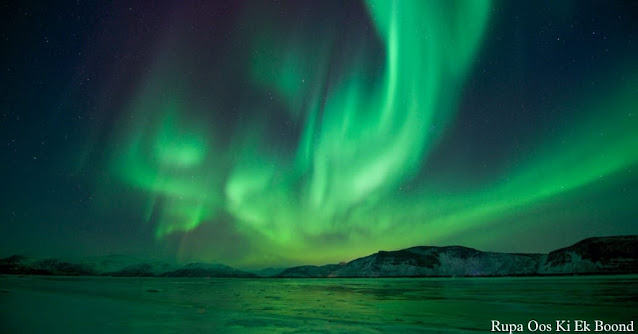
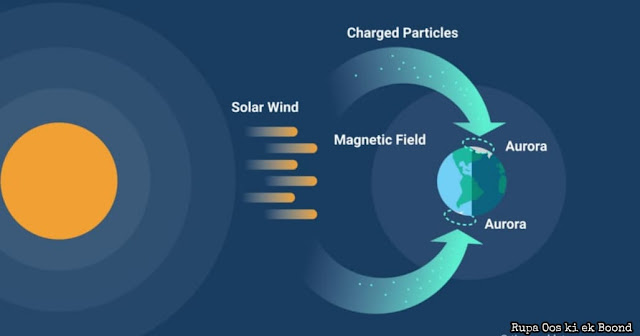
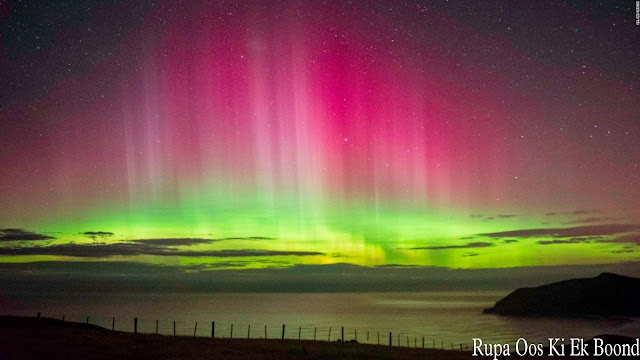
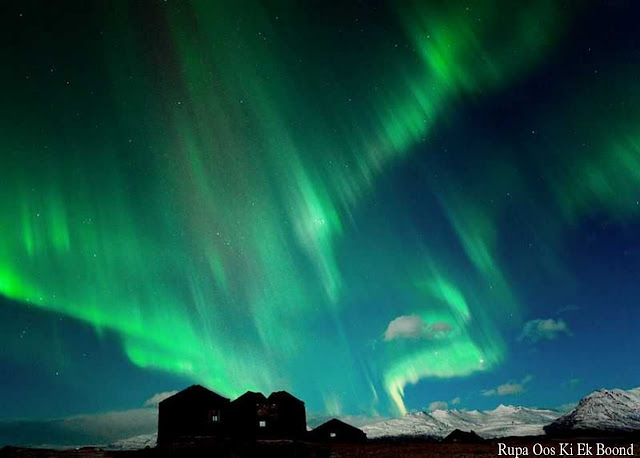
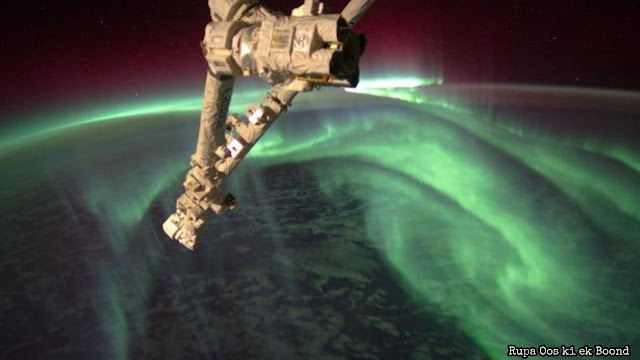

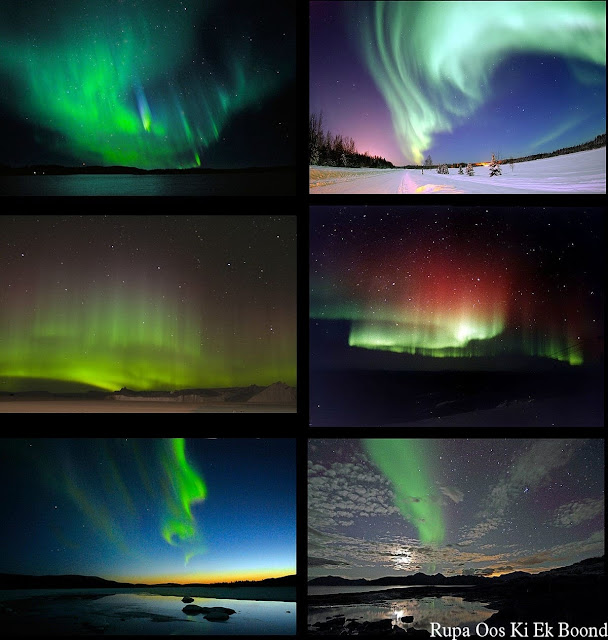




अद्भुत अद्वितीय प्राकृतिक नजारा। इस पोस्ट को पढ़ो और पढ़ते ही जाओ तथा इसके साथ लगे चित्रों को देखें और देखते ही जाओ। गजब की पोस्ट।
ReplyDeleteBeautiful natural light show in the sky 👌👌👌👌👌👌👌👌👌👌👌
अद्भुद
ReplyDeleteVery fascinating, keep up the good work
ReplyDeleteSuper
ReplyDeleteSuper cool fact
ReplyDeleteNorthern Lights. How beautiful it is and how fleeting phenomenon.
ReplyDeleteBeautiful
ReplyDeleteअद्भुत आकाशीय घटना।
ReplyDeleteSuper
ReplyDeleteWonderful
ReplyDeleteSuperbb👍👍
ReplyDeleteWonderful
ReplyDeleteNice
ReplyDeleteये प्राकृतिक छटा तो अद्भुत है, ऐसा पहली बार जानने को मिला...
ReplyDeleteइस ब्लाग के माध्यम से नई नई और अनोखी जानकारियां मिल रहीं..
Thanks to share it 👍👍
Really wonderful
ReplyDeleteadbhut ha ye nazara...yaar pic me itna attractive ha..samne se dekhne ka to anand hi alag hoga..
ReplyDeletegazab ki post...mja aa gya
Wonderful post ..
ReplyDeleteबहुत अच्छी जानकारी, प्रकृति का नजारा अपने आप में अद्भुत, रोमांचक और विस्मयकारी है। ऐसे न जाने कितने रहस्यों से मानव जाति आज भी अनजान हैं।
ReplyDeleteहम जैसे बहुत से लोग होंगे जिन्हें प्रकृति के इस सुंदर दृश्य के बारे मे कोई ज्ञान ही नहीं होगा आप जैसे लोग हम जैसे अज्ञानी लोगों के लिए प्रेरणा है।🙏
ReplyDeleteइसमें अज्ञानी वाली कोई बात नही। सबको सबकुछ पता नही हो सकती। ब्लॉग से जुड़े रहें ऐसी जानकारियां साझा होती रहेंगी।🙏
DeleteNice
ReplyDeleteWonderful post
ReplyDeletebeautiful..great post
ReplyDeleteAdbhut
ReplyDeleteबेहद रोचक और ज्ञानवर्धक पोस्ट।����
ReplyDelete🙏🙏🙏🙏
ReplyDeleteBest Line- आवश्यकता ही अविष्कार की जननी होती है, आप ने बहुत सुंदर प्रेरणादयक विचारो का संग्रह किया है, धन्यवाद
ReplyDeleteबच्चों के नाम की लिस्ट
🙏🏻🙏🏻 Very Nice Information रूपा जी 🙏🏻🙏🏻
ReplyDeleteउत्तम आर्टिकल शेयर करने के लिए आपका हृदय से धन्यवाद।
ReplyDelete